CESA
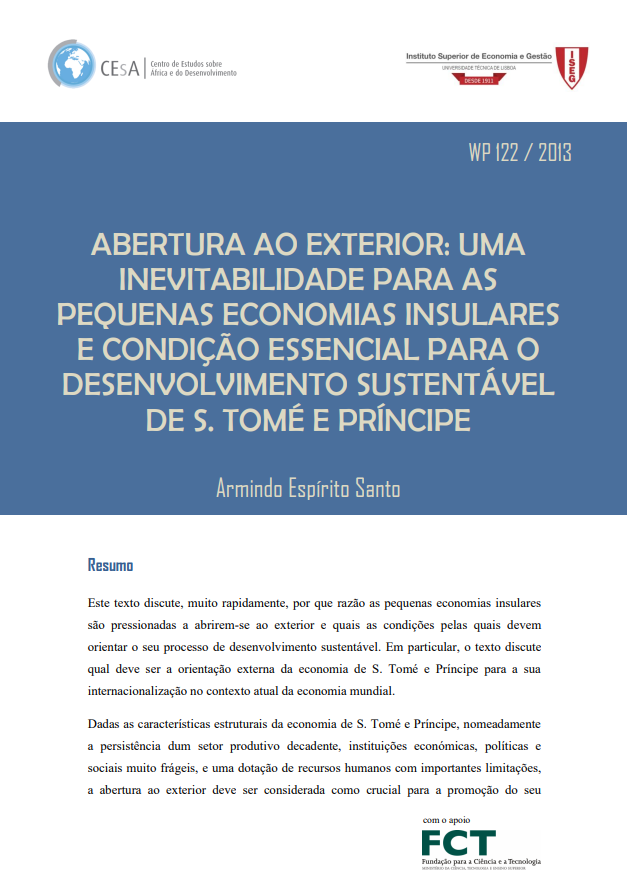
Working Paper 122/2013: Abertura ao exterior: uma inevitabilidade para as pequenas economias insulares e condição essencial para o desenvolvimento sustentável de S. Tomé e Príncipe
Abstract:
Abertura ao exterior : uma inevitabilidade para as pequenas economias insulares e condição essencial para o desenvolvimento sustentável de S. Tomé e Príncipe discusses, very briefly, why small island economies are pressured to open up to the outside and what are the conditions under which they must guide their process of sustainable development. In particular, the text discusses what should be the external orientation of the economy of São Tomé and Príncipe for its internationalization in the current context of the world economy. Given the structural characteristics of the economy of S. Tomé and Príncipe, namely the persistence of a declining productive sector, very fragile economic, political and social institutions, and an endowment of human resources with important limitations, the opening to the outside must be considered as crucial for promoting their development. Furthermore, this country depends exclusively on external flows for its survival. Thus, such openness is essential insofar as it constitutes an incentive for foreign direct investment, which is fundamental for the financing of wealth-producing activities with a view to the sustainable reduction of unemployment and poverty. Greater opening to the outside will tend to progressively increase foreign direct investment and foreign aid, which constitute an important factor, if not the only one at the moment, for the insertion of São Tomé and Príncipe in the current globalized world economy. In order for such openness to contribute to its development, it is proposed that it should be conducted on the basis of economic strategies congruent with the specificity of small island economies. That is, that the selected economic activities suit the small size and isolation of the territory in order to circumvent the negative effects of diseconomies of scale. But also political stability, good governance and valorization of human resources are essential.
Quotation:
Santo, Armindo Espírito. 2013. “Abertura ao exterior : uma inevitabilidade para as pequenas economias insulares e condição essencial para o desenvolvimento sustentável de S. Tomé e Príncipe”. Instituto Superior de Economia e Gestão. CEsA – Documentos de Trabalho nº 122/2013.
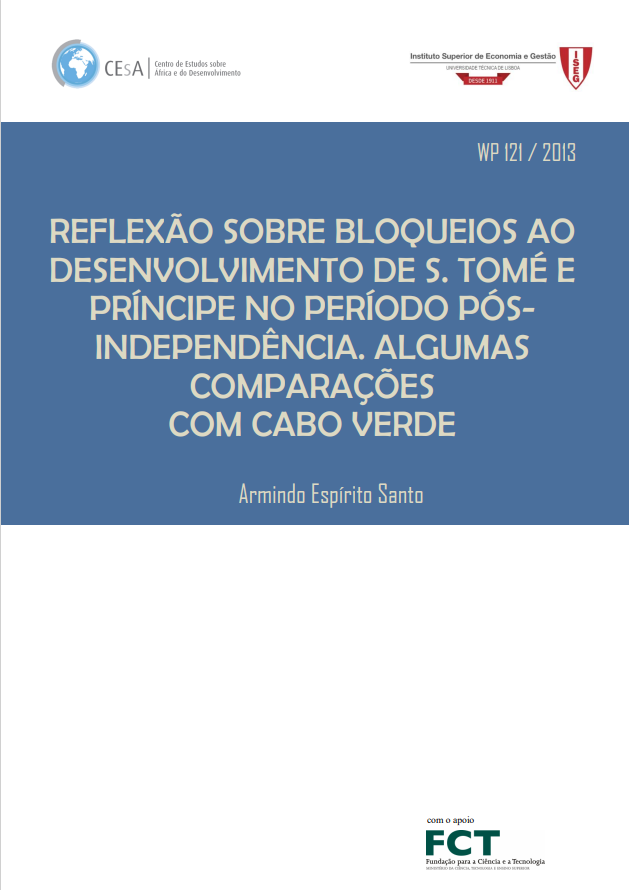
Working Paper 121/2013: Reflexão sobre bloqueios ao desenvolvimento de S. Tomé e Príncipe no período pós-independência. Algumas comparações com Cabo Verde
Abstract:
Everything indicates that the cultural values of the forros were structured as a result of the first major social rupture that took place in the 16th century, with the decline of the sugar economy and the departure of Europeans and their mulatto children to Brazil. The territory was then in the hands of the mestizos (remote descendants of Europeans – grandchildren of Europeans and or the result of interbreeding with each other and with mulattos) who took over the large plantations and slaves. It was during the period in which they administered the territory that the essential cultural values of the forros were structured, which prevail to the present. Such cultural values resulted from a set of schemes used by landless forros with the involvement of land-owning forros to obtain land from the forra elite. Therefore, according to Reflexão sobre bloqueios ao desenvolvimento de S. Tomé e Príncipe no período pós-independência. Algumas comparações com Cabo Verde, everything seems to indicate that the relative backwardness of S. Tomé and Príncipe in terms of development, when compared to Cape Verde, in the post-independence period, is due to the social environment in which the cultural values of the forros were structured. they are resistant to development and not to the return of Europeans in the 19th century. These cultural values, foreign to progress, have led the country to ruptures and discontinuities at various levels (political, economic, social and institutional) and delay or make its sustainable development unfeasible. Therefore, when observing the case of Cape Verde’s relative success in terms of development in relation to STP, the latter’s underdevelopment derives from its human dimension and not from economic factors.
Quotation:
Santo, Armindo Espírito. 2013. “Reflexão sobre bloqueios ao desenvolvimento de S. Tomé e Príncipe no período pós-independência. Algumas comparações com Cabo Verde”. Instituto Superior de Economia e Gestão. CEsA – Documentos de Trabalho nº 121/2013.
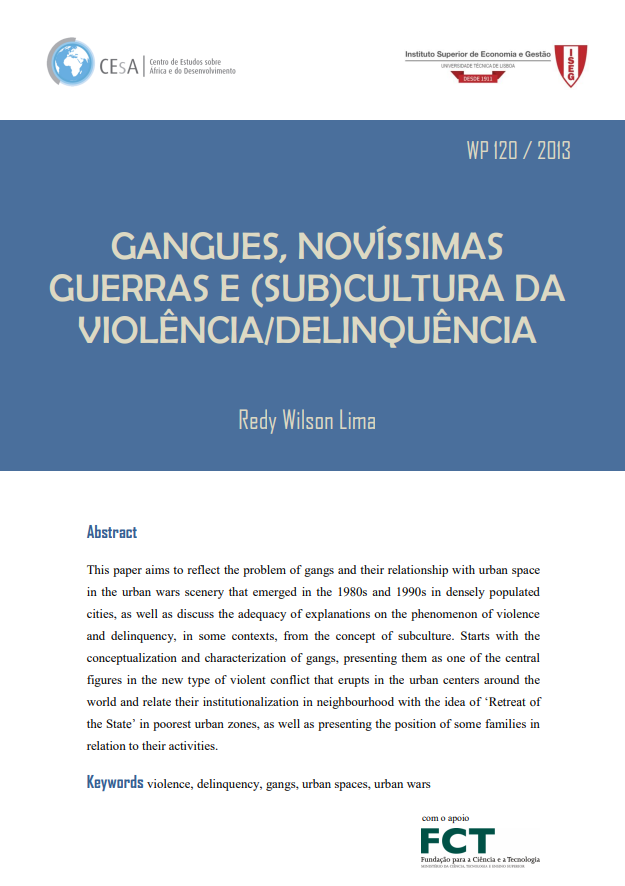
Working Paper 120/2013: Gangues, novíssimas guerras e (sub)cultura da violência/delinquência
Abstract:
Gangues, novíssimas guerras e (sub)cultura da violência/delinquência aims to reflect the problem of gangs and their relationship with urban space in the urban wars scenery that emerged in the 1980s and 1990s in densely populated cities, as well as discuss the adequacy of explanations on the phenomenon of violence and delinquency, in some contexts, from the concept of subculture. Starts with the conceptualization and characterization of gangs, presenting them as one of the central figures in the new type of violent conflict that erupts in the urban centers around the world and relate their institutionalization in neighbourhood with the idea of ‘Retreat of the State’ in poorest urban zones, as well as presenting the position of some families in relation to their activities. In the Cape Verdean case, it is common to hear this type of explanation in the analysis of the phenomenon of violence and/or delinquency, as well as the blaming of poor families and the post-democratic generation for the high crime rates in the 2000s. In most cases, such statements are supported by legal-sociological studies commissioned by national institutions and/or financed by international agencies operating in the archipelago.
Quotation:
Lima, Redy Wilson. 2013. “Gangues, novíssimas guerras e (sub)cultura da violência/delinquência”. Instituto Superior de Economia e Gestão. CEsA/Documentos de Trabalho nº 120/2013.
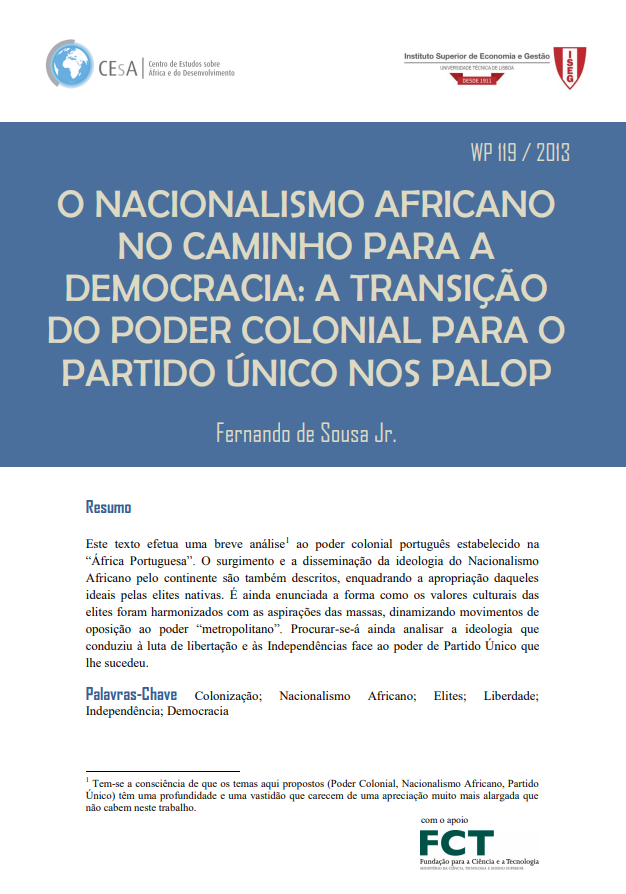
Working Paper 119/2013: O nacionalismo africano no caminho para a democracia: a transição do poder colonial para o partido único nos PALOP
Abstract:
Over several centuries Portugal maintained a close relationship with several peoples, in particular, with the Africans. With the beginning of the Portuguese maritime expansion that took place during the 15th century, the ties became closer. O nacionalismo africano no caminho para a democracia : a transição do poder colonial para o partido único nos PALOP carries out a brief analysis of the Portuguese colonial power established in “Portuguese Africa”. The emergence and dissemination of the ideology of African Nationalism across the continent is also described, framing the appropriation of those ideals by native elites. The way in which the cultural values of the elites were harmonised with the aspirations of the masses, energising opposition movements to “metropolitan” power, is also set out. An attempt will also be made to analyse the ideology that led to the liberation struggle and to the Independence vis-à-vis the Single Party power that succeeded it. The idea of democracy has also been pursued by the rulers of these countries. However, only in the early 1990s, certainly after much international pressure and internal recognition that some of the policies did not achieve the expected results, was there a political opening to a multiparty system.
Quotation:
Sousa Jr., Fernando de. 2013. “O nacionalismo africano no caminho para a democracia : a transição do poder colonial para o partido único nos PALOP”. Instituto Superior de Economia e Gestão. CEsA – Documentos de Trabalho nº 119/2013.
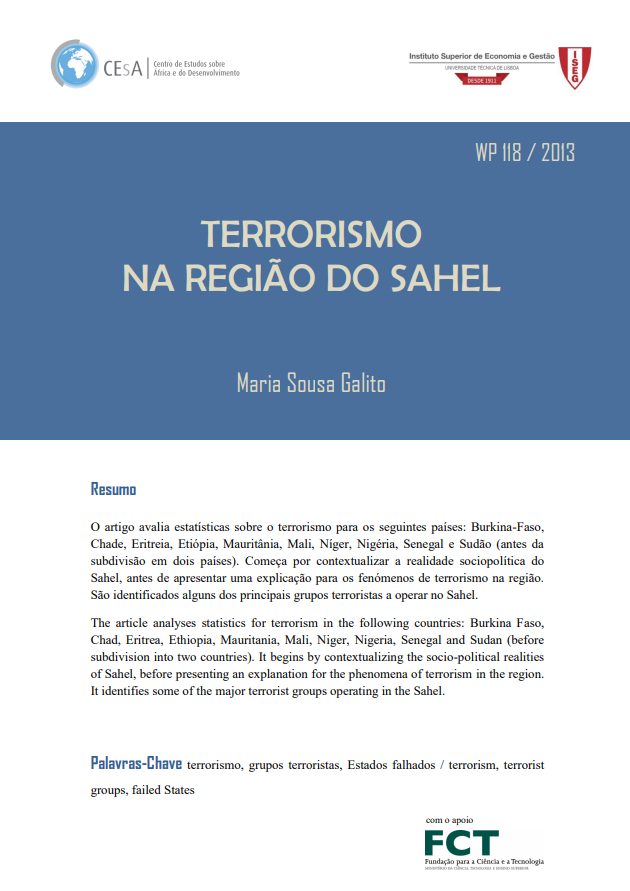
Working Paper 118/2013: Terrorismo na região do Sahel
Abstract:
Terrorismo na região do Sahel assesses terrorism statistics for the following countries: Burkina-Faso, Chad, Eritrea, Ethiopia, Mauritania, Mali, Niger, Nigeria, Senegal and Sudan (before the subdivision into two countries). It begins by contextualising the socio-political reality of the Sahel, before providing an explanation for the phenomena of terrorism in the region. Some of the main terrorist groups operating in the Sahel are identified. The article focuses its investigation on the scope of terrorism in the Sahel. After contextualising the general dynamics of that strategic area, a survey is made on the main dissident groups and on the terrorist acts registered in the Sahel. It tests the hypothesis that the context of socio-economic and political fragility (the fact that the state is considered a “failed state”) facilitates the action of certain armed groups (either guerrillas who use terrorism instrumentally, or terrorists belonging to international networks, and therefore imbued with non-political or local interests), who apply the currency of violence as a means of imposing their agenda. It is clear that the context of socio-economic and political fragility (the fact that the State is considered a “failed State”) has opened the door to freer action by armed groups, from guerrillas with political and autonomous aims, to transnational terrorist networks which take advantage of this to sell and trade drugs, weapons and people in the region, and impose violence as a means of achieving their aims, which take little account of the wellbeing of the local population.
Quotation:
Galito, Maria Sousa. 2013. “Terrorismo na região do Sahel”. Instituto Superior de Economia e Gestão. CEsA – Documentos de Trabalho nº 118/2013.
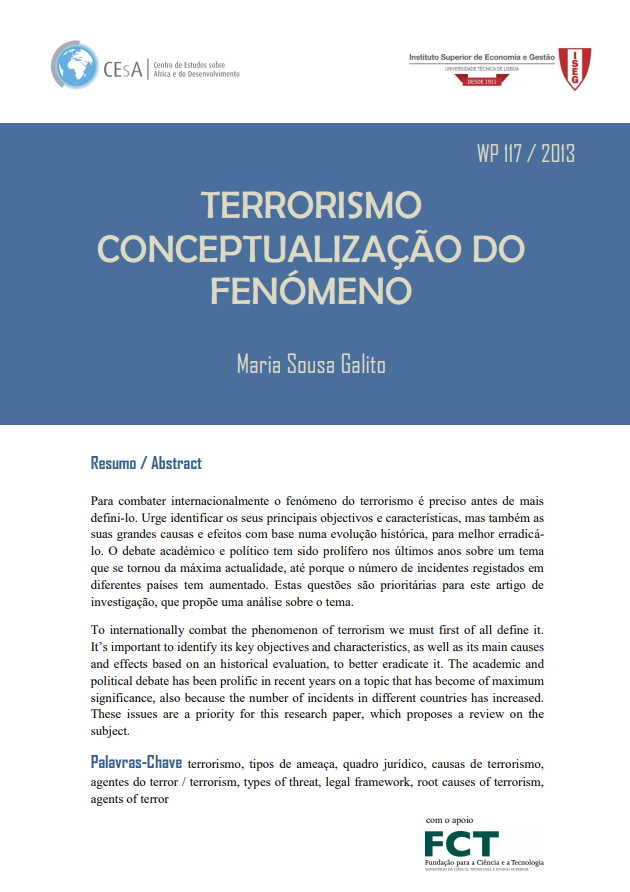
Working Paper 117/2013: Terrorismo: conceptualização do fenómeno
Abstract:
In order to combat terrorism internationally, it is first necessary to define it. It is urgent to identify its main objectives and characteristics, but also its main causes and effects based on historical developments, in order to better eradicate it. The academic and political debate has been prolific in recent years on a subject that has become highly topical, not least because the number of incidents recorded in different countries has increased. Terrorismo : conceptualização do fenómeno tests two levels of analysis. First, that the phenomenon of terrorism is complex and multifaceted, both in terms of causes and effects, so that its definition is problematic. Different concepts and types of terrorism proposed in the academic and political sphere are analysed. Its essential objectives are identified, as well as some of the main domestic and international laws adopted to eradicate it. Secondly, it seeks to clarify and interpret the limits of a phenomenon that is not new but a model of action with history. In fact, the enunciation of what terrorism is is essential so that each nation and the international community as a whole may identify the groups that may be included in this “terrorist” classification (some of those groups are listed in the annex).
Quotation:
Galito, Maria Sousa. 2013. “Terrorismo : conceptualização do fenómeno”. Instituto Superior de Economia e Gestão. CEsA –Documentos de Trabalho nº 117/2013.
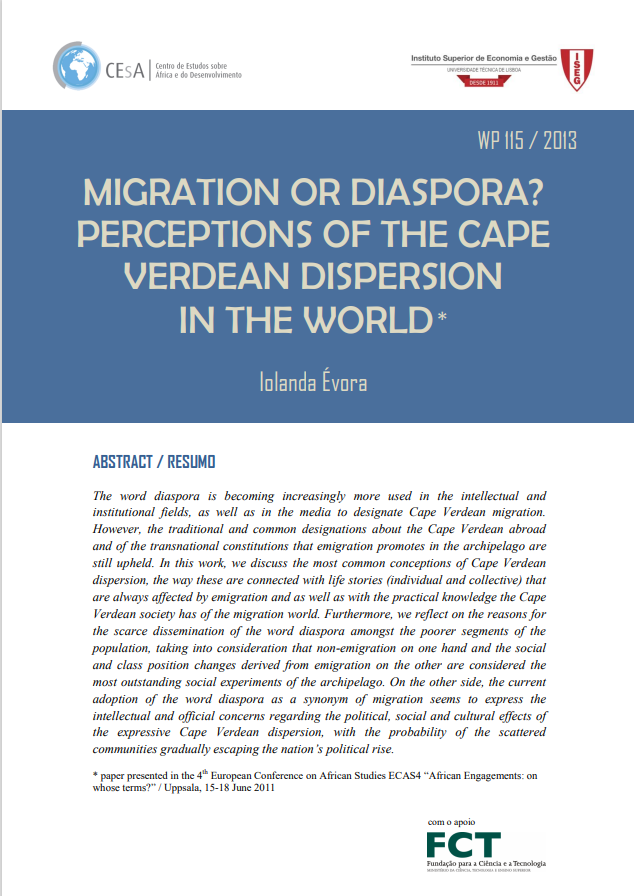
Working Paper 115/2013: Migration or diaspora? Perceptions of the Cape Verdean dispersion in the world
Abstract:
The word diaspora is becoming increasingly more used in the intellectual and institutional fields, as well as in the media to designate Cape Verdean migration. However, the traditional and common designations about the Cape Verdean abroad and of the transnational constitutions that emigration promotes in the archipelago are still upheld. In Migration or diaspora? Perceptions of the Cape Verdean dispersion in the world, we discuss the most common conceptions of Cape Verdean dispersion, the way these are connected with life stories (individual and collective) that are always affected by emigration and as well as with the practical knowledge the Cape Verdean society has of the migration world. Furthermore, we reflect on the reasons for the scarce dissemination of the word diaspora amongst the poorer segments of the population, taking into consideration that non-emigration on one hand and the social and class position changes derived from emigration on the other are considered the most outstanding social experiments of the archipelago. On the other side, the current adoption of the word diaspora as a synonym of migration seems to express the intellectual and official concerns regarding the political, social and cultural effects of the expressive Cape Verdean dispersion, with the probability of the scattered communities gradually escaping the nation’s political rise.
Quotation:
Évora, Iolanda. 2013. “Migration or diaspora? Perceptions of the Cape Verdean dispersion in the world”. Instituto Superior de Economia e Gestão. CEsA – Documentos de Trabalho nº 115/2013.
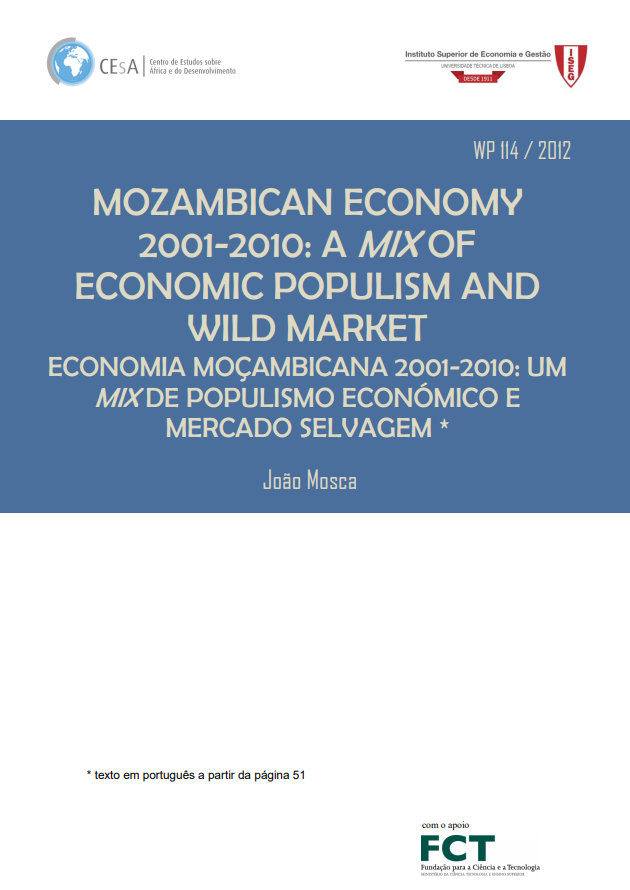
Working Paper 114/2012: Mozambican economy 2001-2010: a mix of economic populism and wild market
Abstract:
Mozambican economy 2001-2010: a mix of economic populism and wild market performs a general analysis of the economic evolution for the period comprised between 2001 and 2010 and it tries to define the main features according to an economic policy and political economy based upon paradigms of interdisciplinarity. The hypothesis of the study is to verify whether during the first decade of the 21st century there were policies and economic measures which can be defined by a growth model in which there is a combination of elements of a liberal economy at a micro level and a corporate public sector (State Capitalism) used, by the one hand, for the capture of income for the State and ruling party with off- budget financing, for the political elite and, on the other hand, for the application of redistributive measures mainly directed towards urban people so as to ensure alliances of power reproduction and the consolidation of an accumulation pattern internally focused, but centered out of the country. The practice of policies of the so-called economic populism is demonstrated through expansive monetary and budget policies, income adjustments above the inflation and high investment rates, mainly when the FDI is included. The populist nature is strengthened if the fact that the expansive policies are supported by external resources (to the State budget, in investment and in financing the balance of payments) and not by the wealth generated by the economy in public receipts is taken into consideration. Economic populism is also employed through the orchestration of public companies with politicized economic decisions. The consequence of these options were verified throughout the decade: increase of the deficit of the trade balance with growing imports; exacerbation of the dependency; high conjunctural variabilities in the exchange rate; increment of the public deficit (not including the external resources that finance the general State budget); the secundarization of the productive sectors that produce to the internal market and consequent prioritization of the exports of the large projects with the marginalization of the “traditional” productive fabric” and the externalization of the accumulation pattern. There are clear signs of the dual structure of the economy. The model of growth is not endogenous.
Quotation:
Mosca, João. 2012. “Mozambican economy 2001-2010: a mix of economic populism and wild market”. Instituto Superior de Economia e Gestão. CEsA – Documentos de Trabalho nº 114/2012.
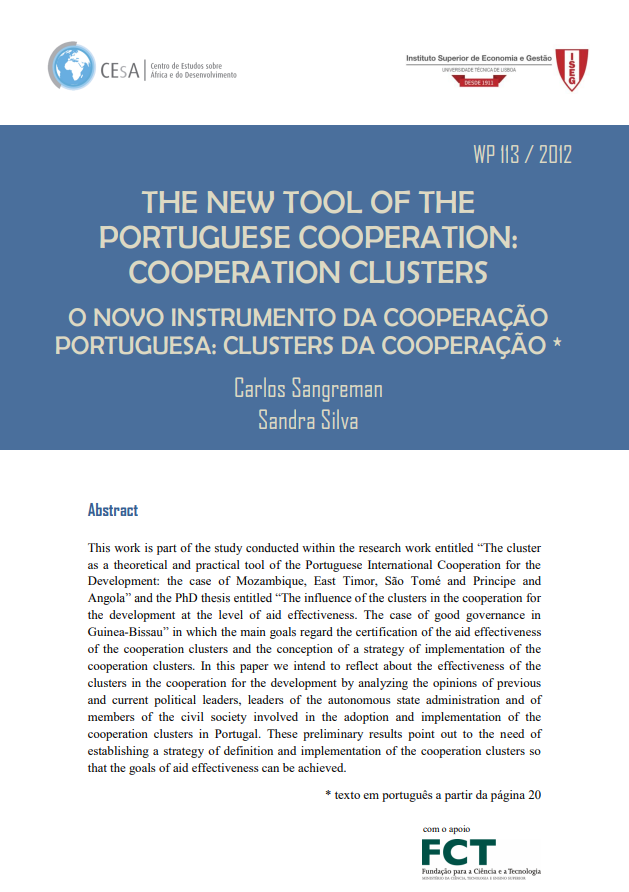
Working Paper 113/2012: The new tool of the Portuguese cooperation: cooperation clusters
Abstract:
This work is part of the study conducted within the research work entitled “The cluster as a theoretical and practical tool of the Portuguese International Cooperation for the Development: the case of Mozambique, East Timor, São Tomé and Principe and Angola” and the PhD thesis entitled “The influence of the clusters in the cooperation for the development at the level of aid effectiveness. The case of good governance in Guinea-Bissau” in which the main goals regard the certification of the aid effectiveness of the cooperation clusters and the conception of a strategy of implementation of the cooperation clusters. In The new tool of the Portuguese cooperation: cooperation clusters we intend to reflect about the effectiveness of the clusters in the cooperation for the development by analyzing the opinions of previous and current political leaders, leaders of the autonomous state administration and of members of the civil society involved in the adoption and implementation of the cooperation clusters in Portugal. These preliminary results point out to the need of establishing a strategy of definition and implementation of the cooperation clusters so that the goals of aid effectiveness can be achieved.
Quotation:
Sangreman, Carlos e Sandra Silva. 2012. “The new tool of the Portuguese cooperation: cooperation clusters”. Instituto Superior de Economia e Gestão. CEsA/Documentos de Trabalho nº 113/2012.
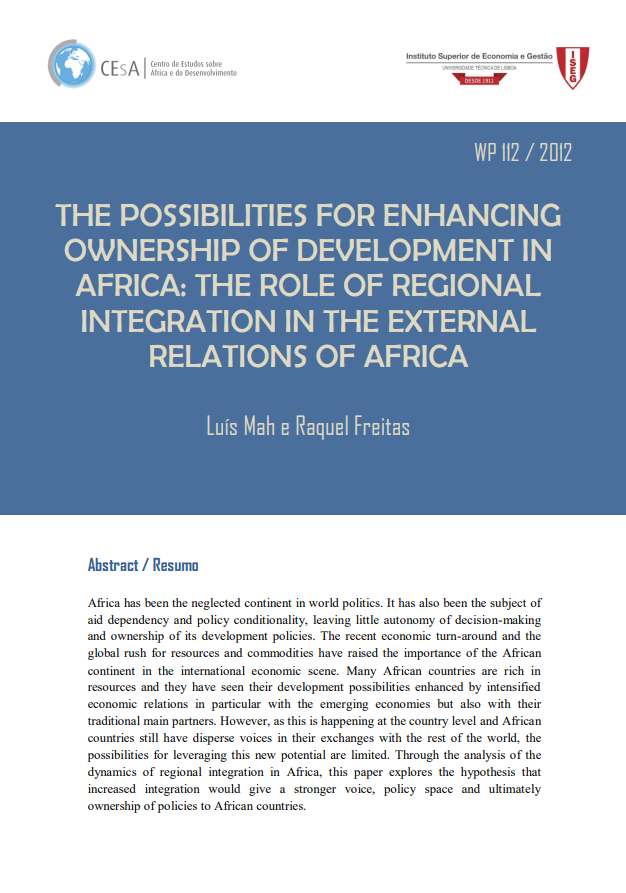
Working Paper 112/2012: The possibilities for enhancing ownership of development in Africa: the role of regional integration in the external relations of Africa
Abstract:
Africa has been the neglected continent in world politics. It has also been the subject of aid dependency and policy conditionality, leaving little autonomy of decision-making and ownership of its development policies. The recent economic turn-around and the global rush for resources and commodities have raised the importance of the African continent in the international economic scene. Many African countries are rich in resources and they have seen their development possibilities enhanced by intensified economic relations in particular with the emerging economies but also with their traditional main partners. However, as this is happening at the country level and African countries still have disperse voices in their exchanges with the rest of the world, the possibilities for leveraging this new potential are limited. Through the analysis of the dynamics of regional integration in Africa, The possibilities for enhancing ownership of development in Africa: the role of regional integration in the external relations of Africa explores the hypothesis that increased integration would give a stronger voice, policy space and ultimately ownership of policies to African countries.
Quotation:
Mah, Luís, Raquel Freitas. 2012. “The possibilities for enhancing ownership of development in Africa: the role of regional integration in the external relations of Africa”. Instituto Superior de Economia e Gestão. CEsA – Documentos de Trabalho nº112/2012.





